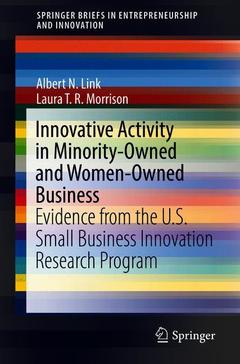Innovative Activity in Minority-Owned and Women-Owned Business, 1st ed. 2019 Evidence from the U.S. Small Business Innovation Research Program SpringerBriefs in Entrepreneurship and Innovation Series
Auteurs : Link Albert N., Morrison Laura T. R.

Examines the innovative behavior of minority- and women-owned entrepreneurial firms
Analyses data from the US Small Business Innovation Research (SBIR) program and National Research Council (NRC)
Explores multiple dimensions of innovative behavior among entrepreneurial firms
Offers a foundation for future research on business ownership demographics and innovative behavior
Date de parution : 08-2019
Ouvrage de 103 p.
15.5x23.5 cm
Thème d’Innovative Activity in Minority-Owned and Women-Owned... :
Mots-clés :
US Small Business Innovation Research (SBIR) Program; Minority-owned Business; Women-owned Business; National Research Council (NRC); Innovative Activity; Human Capital; Commercialized Technology; Federally funded research; Technology-based Research; Public-sector agencies' investments in research; Entrepreneurial Ecosystem; Science; Technology; Engineering; and Mathematics (STEM); STEM Education



